The inevitable capitulation of the PKK
Submitted by Anonyme (non vérifié) So, this happened: Abdullah Öcalan called to the disarmament of the PKK (Kurdistan Workers Party), whereas these last days the DHKP-C made numerous armed attacks, to propose on the contrary to maintain the hard-line against Turkish fascism.
So, this happened: Abdullah Öcalan called to the disarmament of the PKK (Kurdistan Workers Party), whereas these last days the DHKP-C made numerous armed attacks, to propose on the contrary to maintain the hard-line against Turkish fascism.
Yesterday, for Newrosz – the Kurdish (and Persian) New Year – a Kurdish parliamentarian has read a statement from Abdullah Öcalan at a meeting in Diyarbakir, in the front of 250,000 people.
Diyarbakir, a city in the south-east of Turkey, is the main city of Turkish Kurdistan. Such an event means that the whole PKK movement follows the line of Abdullah Öcalan, whose message explained:
"We have reached the point where the guns must be silenced and where ideas must speak. A new era has started, where it is politics, not guns, which is at the forefront."
"We have reached the stage where our armed elements need to retreat beyond the border."
It is not the first time that the PKK proclaims a cease-fire (it did for example in 1999 and 2004); nevertheless this time, the Turkey’s Interior Minister hailed Öcalan’s “language of peace”.
The capitulation of the PKK, something expected since 20 years
This is all of course no surprise for who know the PKK since 20 years. If it was born on 1978 as a “communist” national liberation movement, as soon as the USSR collapsed it went in the direction of “federalism”.
When Öcalan was arrested in 1999, he even praised kemalism; what is happening now is part of a process lasting since the middle of the 1990's.
Nobody on the left in Turkey could not know this, but opportunism dominated, because of the importance of nationalism in the Kurdish masses and also of the importance of the Kurdish guerrilla.
Most of the parties kept a “no criticism” policy and placed themselves as leftist structures subjected to the PKK and its line, which went more and more in direction of an agreement.
Turkish expansionism and its aim to split Iraq
To understand how this capitulation was possible i.e. acceptable for the Turkish side, it is necessary to understand the situation in the area.
Kemalism was born as an ultra-nationalist ideology of a bureaucratic bourgeoisie who suppressed in a fascist way all proletarian opposition, in the name of Republic. In the same way, it rejected any recognition of the numerous peoples present in Turkey.
But the kemalist bureaucratic bourgeoisie was connected to the USA, and in the last 20 years a new bureaucratic bourgeoisie, islamist, came into power, this time submitted, especially, to Germany.
After having put aside the huge power of the Turkish army, the islamists are ready to put aside the republican kemalist ideology, because the goal is to use the Kurdish question to create a protectorate in western Iraq, in the Kurdish zone.
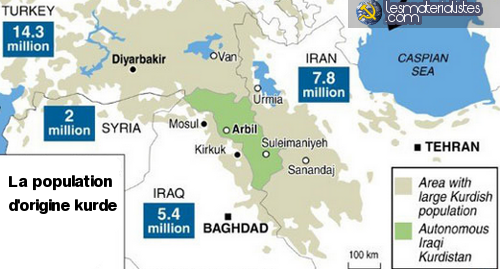
Turkish massive economical presence in Kurdish Iraq
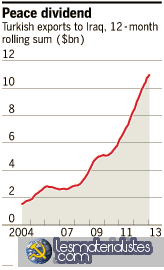
Iraq has been the second largest destination for Turkish exports in 2011, and the overhelming majority goes to the Kurdish zone. Only in 2012, Turkey made $3.5 billion of construction projects there.
In Kurdish Iraq are present 1000 Turkish businesses and in the background there are the rich oil and gas resources – Kurdish Iraq produces 250,000 barrels a day and wants to move to 1 million barrels a day for 2015.
If Turkey is able to have the hegemony on Kurdish Iraq, then the oil of companies like Exxon Mobil Corp. Chevron Corp and Total could use a pipeline across Turkey itself; Turkey would win resources, but also money from the crossing fees.
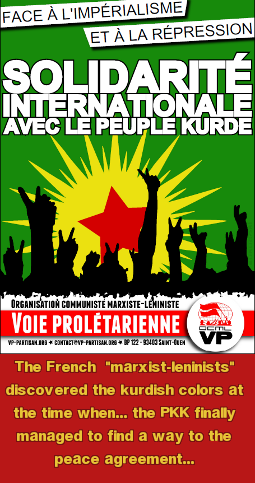
Opportunism towards the PKK is not helping the Kurdish people!
In Paris, middle January, three PKK activists were murdered, in a manner that is the one of the secret service. On this occasion, French “Marxist-Leninists” or even imagining themselves being Maoists raise the “Kurdish National Liberation” movement.
But as we noticed already at that time, it was well known that the PKK was negotiating with the Turkish state, whereas its goal was anyway not the independence any more, and this since the 1990's!
As the article said: “To see the French far left-wing boast revolutionary positions on the back of Kurdish activists murdered is pathetic or even sordid”.
So, in front of the capitulation of the PKK, we can say that those who praised the PKK during the two last months were objectively the agents of the capitulation, because instead of raising the level of the masses and warning them about the open capitulation coming, they praised an imaginary “national liberation movement” which existed only in their idealist romantic conception, but certainly not in Kurdistan.
It is really a sign when people who did nothing for the Kurdish people, not knowing its history nor the ideological-political and cultural conceptions of the organizations in Turkey, praise an organization who is gonna make a capitulation in the next weeks.
It is a sign of convergence with the aims of imperialism, and not with the communist position of refusing the peace agreement.
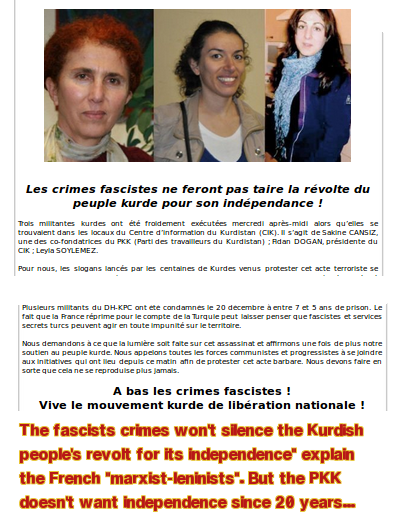
The attempt of the DHKP-C
It is very hard to understand the very heavy atmosphere that creates the PKK in its strategy of the peace agreement. If the masses participating in the PKK movement were always near culturally of the far left, this had to “submit” to the strategy of the PKK.
The collapse of the far left in 1999, when Öcalan was arrested, was a trauma for the far left that, since that, tried to be as near possible from the PKK.
Only one organization managed to keep a strong independence: the DHKP-C (Revolutionary People's Liberation Party–Front). This guevarist organization – which appreciates Stalin and Mao Zedong also – is one of the numerous illegal revolutionary organizations in Turkey.

By its important size and its really strong culture, the DHKP-C always managed to keep his independence and its criticism towards the PKK, which brought sometimes much trouble from the side of the PKK, who always has been totally pragmatic and never based on communist morality.
The DHKP-C, direct successor of Devrimci Sol (Revolutionary Left), aims a multinational Turkey.
On 1 February 2013, a very ill militant of it committed a suicide with a bomb in the embassy of the USA; it was in a way a direct answer to the formalization of the Turkey – PKK negotiation, and the statement openly mentions the numerous different peoples of Turkey (Turks, Kurds, Armenians, Laz, Circassians, Arabs, etc.), with the aim of a multinational state.
 Yesterday, the DHKP-C attacked two government offices in the Turkish capital Ankara, firing a rocket at Prime Minister Recep Tayyip Erdogan's party headquarters and hurling two hand-grenades at the Justice Ministry's parking.
Yesterday, the DHKP-C attacked two government offices in the Turkish capital Ankara, firing a rocket at Prime Minister Recep Tayyip Erdogan's party headquarters and hurling two hand-grenades at the Justice Ministry's parking.
Of course, the statement doesn't deal with the PKK's capitulation, but only about the struggle against fascism. It is a way to promote the continuity of the revolutionary struggle.
The terrible situation for the far left in Turkey
The capitulation of the PKK is a terrible bill for the far left in Turkey. Since 1999, all the organizations – the DHKP-C part – played a line that was a mix between tacit recognition of the hegemony of the PKK and parasitism of the Kurdish movement.
The revolutionary organizations – the DHKP-C apart – stayed mostly blocked in their development, because their cultural identity was strongly connected to strong areas (like for example the Kurdish Zaza community and its area of Tünceli / Dersim for some Maoists, etc.).
In this opportunist dream, the end of the PKK was thought as never coming. Against the strong fascist Turkish state, the PKK – even if on a line of capitulation – was a protecting umbrella.
How to react after this umbrellas has gone? This will be a terrible and decisive moment, which will bring a calling into question of all what has been done since the middle of the 1990's.
The three revolutionary traditions in Turkey and the question of strategy
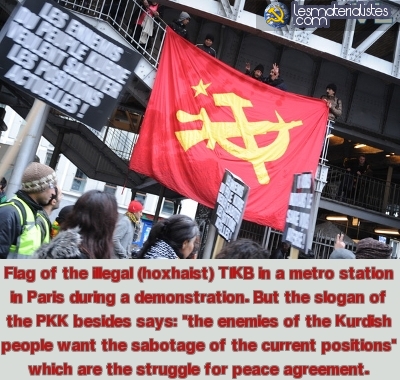
In Turkey, there are three important revolutionary traditions, with their own culture, their own illegal organizations, which maintain good or very good relationships of solidarity.
The first one is the hoxhaist, following the line of Deniz Gezmiş who founded the THKO (People's Liberation Army of Turkey). The line was the one of a guerrilla, without a party.
The second is the guevarist, following the line of Mahir Çayan who founded the THKP/C (People's Liberation Party–Front of Turkey), as party-guerrilla.
In 1972, Deniz Gezmiş was arrested and before he was hanged, Mahir Çayan launched an operation to free him, which failed and where he died.
The third one is the Maoist, following the line of İbrahim Kaypakkaya, who died at the age of 24 after having established the TKP/ML (Communist Party of Turkey/Marxist-Leninist) and TIKKO (Workers' and Peasants' Liberation Army in Turkey).
According the hoxhaist tradition, Turkey is a capitalist country (line of the nowadays MLKP, TIKB...); according the guevarist tradition, Turkey is a neo-colony submitted to an oligarchy and US imperialism (line of the DHKP/C...); according to the Maoist tradition, Turkey is semi-colonial semi-feudal.
It means that for the first, Kemalism represented the bourgeoisie; for the second, kemalism is a bourgeois ideology which failed; for the third, kemalism is a counter-revolution forming a bureaucratic bourgeoisie.
All considers Turkey as fascist today – but how to analyze the peace agreement coming?
What about the Maoists in Turkey?
There are two main Maoist organizations in Turkey:
- the TKP/ML, which opposes to Gonzalo's thesis and is on the pragmatic line of the CP of the Philippines and the CP of India (Maoist);
- the MKP, ex TKP(ML), which after having defend Gonzalo came on the line of the CP of Nepal (Maoist) and the following centrists.
What will be their position in this situation? In any case, a jump is needed.
In 1972, Ibrahim Kaypakkaya recognized theoretically the Kurdish nation, but it was a bourgeois movement, the PKK, who managed to take the lead over the Kurdish struggle in Turkey at the end of the 1970's and the beginning of the 1980's.
In the same way, the People's War knew some great phases, but it didn't last. And any way, more and more the political and cultural weight of the organizations tumbled into the Turkish diaspora in Germany, Switzerland, Austria, Holland, Belgium and France.
The situation is so bad that even anarchism appeared those last years in Turkey – of course only in Istanbul, but it is still a sign.
A great challenge is gonna be faced by the Maoists in Turkey!



